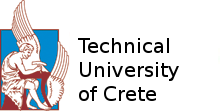1st November 2013, Chania, Greece
Technical University of Crete
You are here
Professor Petros Ioannou
Short CV
 Petros A. Ioannou received the B.Sc. degree with First Class Honors from University College, London, England, in 1978 and the M.S. and Ph.D. degrees from the University of Illinois, Urbana, Illinois, in 1980 and 1982, respectively. During the period 1975-1978, he held a Commonwealth Scholarship from the Association of Commonwealth Universities, London, England. He was awarded several prizes, including the Goldsmid Prize and the A. P. Head Prize from University College, London. From 1979 to 1982 he was a research assistant at the Coordinated Science Laboratory at the University of Illinois.
Petros A. Ioannou received the B.Sc. degree with First Class Honors from University College, London, England, in 1978 and the M.S. and Ph.D. degrees from the University of Illinois, Urbana, Illinois, in 1980 and 1982, respectively. During the period 1975-1978, he held a Commonwealth Scholarship from the Association of Commonwealth Universities, London, England. He was awarded several prizes, including the Goldsmid Prize and the A. P. Head Prize from University College, London. From 1979 to 1982 he was a research assistant at the Coordinated Science Laboratory at the University of Illinois.
In 1982, Dr. Ioannou joined the Department of Electrical Engineering-Systems, University of Southern California, Los Angeles, California. He is currently a Professor in the same Department and the Director of the Center of Advanced Transportation Technologies. He holds courtesy appointments with the Department of Aerospace and Mechanical Engineering, the Department of Industrial System Engineering and the Computer Science Department of the University of Cyprus. He is the Associate Director for Research for the University Transportation Center METRANS at the University of Southern California since 2006. His research interests are in the areas of adaptive control, neural networks, nonlinear systems, vehicle dynamics and control, intelligent transportation systems and marine transportation. He was visiting Professor at the University of Newcastle, Australia and the Australian National University in Canberra during parts of Fall of 1988, the Technical University of Crete in summer of 1992 and Fall of 2001, the University of Cyprus in 1995/96 and the Cyprus University of Technology in 2009. Dr. Ioannou was the recipient of the Outstanding Transactions Paper Award by the IEEE Control System Society in 1984 and the recipient of a 1985 Presidential Young Investigator Award for his research in Adaptive Control. In 2009 he received the IEEE ITSS Outstanding ITS Application Award for his work on Adaptive Cruise Control Systems. He also received the 2009 IET Heaviside Medal for Achievement in Control by the Institution of Engineering and Technology (former IEE). In 2012 he received the IEEE ITSS Outstanding ITS Research Award. He has been an Associate Editor for the IEEE Transactions on Automatic Control, the International Journal of Control, Automatica and IEEE Transactions on Intelligent Transportation Systems. He served as a Member of the Control System society on IEEE ITS Council Committee and his center on advanced transportation technologies was a founding member of IVHS America which was later renamed ITS America. He also served as Associate Editor at Large of the IEEE Transactions on Automatic Control and Chairman of the IFAC Technical Committee on Transportation Systems. He is a member of the Board of Governors of the IEEE Intelligent Transportation Society. He is one of the founders of the Mediterranean Control Association and a member of the Board of Governors. He was one of the founders of the IEEE Mediterranean Control Conference, which has been taking place annually since 1992 and one of the founders of the University Transportation Center, METRANS, at the University of Southern California and California State University Long Beach.
Dr. Ioannou is a Fellow of IEEE, Fellow of International Federation of Automatic Control (IFAC), Fellow of the Institution of Engineering and Technology (IET), and the author/co-author of 8 books and over 300 research papers in the area of controls, vehicle dynamics, neural networks, nonlinear dynamical systems and intelligent transportation systems.
Traffic Flow Modeling and Control: Closing the Loop
The current traffic system operates almost like an open loop system. Limited traffic flow measurements, and lack of interaction between vehicles and infrastructure adds uncertainties that make both modeling and control very challenging. Vehicles are passive users of the traffic network trying to meet individual objectives by obeying some traffic rules. The infrastructure is also playing a less passive role by maintaining the network, providing some control actions such as traffic light control where traffic lights exist and in limited cases ramp metering in addition to maintaining traffic flow sensors and their measured outputs. Intelligent transportation technologies will change this picture in the absence of any other option. Vehicles will becoming more intelligent, more automated, enhancing safety and mobility and will be connected with the infrastructure to act both as sensors and actuators. The infrastructure will have much more reliable information and measurements regarding traffic flow characteristics, accidents, congestion etc which would allow it to generate more accurate control variables to close the loop and boost capacity and efficiency. Some of the control variables will include speed limit control, lane change control, ramp metering, routing, pricing, slow vehicle priority rules at traffic lights etc. On the vehicle level adaptive cruise control, lane change assist, collision warning devices, more accurate navigation instructions etc in conjunction with the infrastructure control commands will improve safety, mobility as well as reduce pollution and improve fuel economy. In such a system the traditional traffic flow models need to be revisited and modified in order to incorporate the use of these technologies. In this talk in addition to discussing these issues we will present such a modification for a macroscopic traffic flow model. In addition we will present some results regarding speed limit and lane change control by using as performance measures, travel time, environmental impact, safety improvement based on Monte Carlo microscopic traffic simulations. The case of vehicles with adaptive cruise control capabilities has also been included.
Intelligent Vehicles: Adaptive Cruise Control and beyond
In this talk we review the design of adaptive cruise control (ACC) systems to guarantee vehicle stability, string stability, driver comfort, smooth vehicle following and safety. In addition we will raise some issues associated with senor reliability and human factors. We will then use microscopic simulation studies and some analysis to examine the impact of ACC vehicles on traffic flow characteristics, speed limit control, environment, travel time etc. We will then discuss vehicle technologies that will impact travel time especially in Urban areas. We talk about the importance of personalized vehicle services when it comes to parking, navigation, lane change, speed control, safety warnings that will impact traffic flow characteristics.


